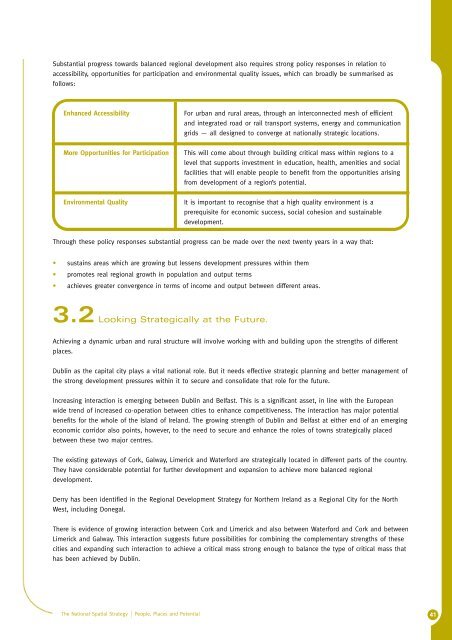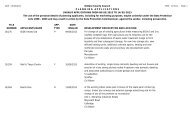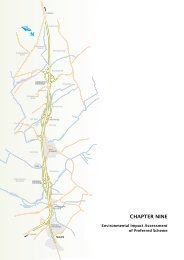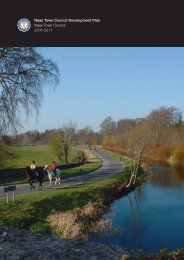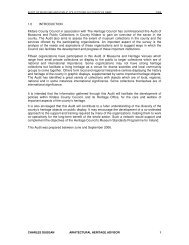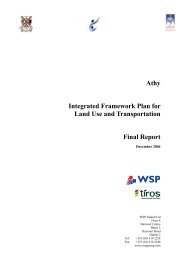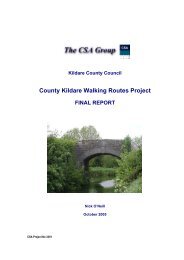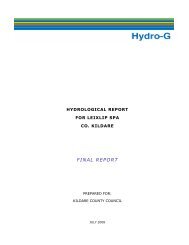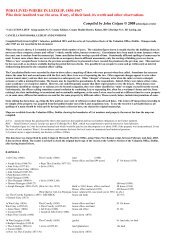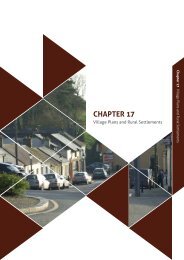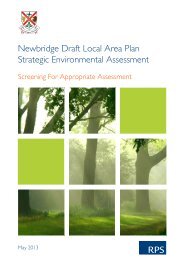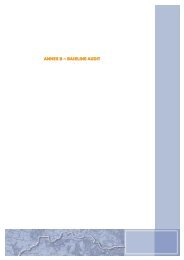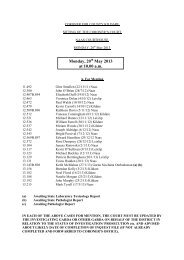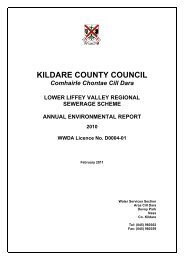National Spatial Strategy For Ireland 2002 - 2020 - Full ... - Kildare.ie
National Spatial Strategy For Ireland 2002 - 2020 - Full ... - Kildare.ie
National Spatial Strategy For Ireland 2002 - 2020 - Full ... - Kildare.ie
Create successful ePaper yourself
Turn your PDF publications into a flip-book with our unique Google optimized e-Paper software.
Substantial progress towards balanced regional development also requires strong policy responses in relation to<br />
accessibility, opportunit<strong>ie</strong>s for participation and environmental quality issues, which can broadly be summarised as<br />
follows:<br />
Enhanced Accessibility <strong>For</strong> urban and rural areas, through an interconnected mesh of effic<strong>ie</strong>nt<br />
and integrated road or rail transport systems, energy and communication<br />
grids — all designed to converge at nationally strategic locations.<br />
More Opportunit<strong>ie</strong>s for Participation This will come about through building critical mass within regions to a<br />
level that supports investment in education, health, amenit<strong>ie</strong>s and social<br />
facilit<strong>ie</strong>s that will enable people to benefit from the opportunit<strong>ie</strong>s arising<br />
from development of a region’s potential.<br />
Environmental Quality It is important to recognise that a high quality environment is a<br />
prerequisite for economic success, social cohesion and sustainable<br />
development.<br />
Through these policy responses substantial progress can be made over the next twenty years in a way that:<br />
• sustains areas which are growing but lessens development pressures within them<br />
• promotes real regional growth in population and output terms<br />
• ach<strong>ie</strong>ves greater convergence in terms of income and output between different areas.<br />
3.2 Looking Strategically at the Future.<br />
Ach<strong>ie</strong>ving a dynamic urban and rural structure will involve working with and building upon the strengths of different<br />
places.<br />
Dublin as the capital city plays a vital national role. But it needs effective strategic planning and better management of<br />
the strong development pressures within it to secure and consolidate that role for the future.<br />
Increasing interaction is emerging between Dublin and Belfast. This is a significant asset, in line with the European<br />
wide trend of increased co-operation between cit<strong>ie</strong>s to enhance competitiveness. The interaction has major potential<br />
benefits for the whole of the island of <strong>Ireland</strong>. The growing strength of Dublin and Belfast at either end of an emerging<br />
economic corridor also points, however, to the need to secure and enhance the roles of towns strategically placed<br />
between these two major centres.<br />
The existing gateways of Cork, Galway, Limerick and Waterford are strategically located in different parts of the country.<br />
They have considerable potential for further development and expansion to ach<strong>ie</strong>ve more balanced regional<br />
development.<br />
Derry has been identif<strong>ie</strong>d in the Regional Development <strong>Strategy</strong> for Northern <strong>Ireland</strong> as a Regional City for the North<br />
West, including Donegal.<br />
There is evidence of growing interaction between Cork and Limerick and also between Waterford and Cork and between<br />
Limerick and Galway. This interaction suggests future possibilit<strong>ie</strong>s for combining the complementary strengths of these<br />
cit<strong>ie</strong>s and expanding such interaction to ach<strong>ie</strong>ve a critical mass strong enough to balance the type of critical mass that<br />
has been ach<strong>ie</strong>ved by Dublin.<br />
The <strong>National</strong> <strong>Spatial</strong> <strong>Strategy</strong> | People, Places and Potential 41


